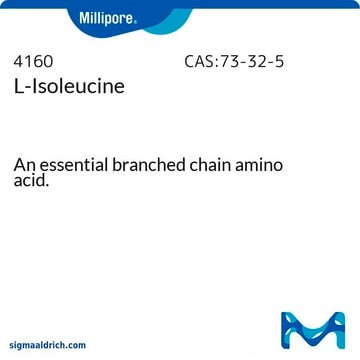58879
L-Isoleucine
≥99.5% (TLC), BioUltra
Synonym(s):
(2S,3S)-2-Amino-3-methylpentanoic acid
About This Item
Recommended Products
product name
L-Isoleucine, BioUltra, ≥99.5% (NT)
product line
BioUltra
Quality Level
Assay
≥99.5% (NT)
≥99.5% (TLC)
form
powder or crystals
optical activity
[α]20/D +41.0±1°, c = 5% in 6 M HCl
impurities
insoluble matter, passes filter test
≤0.5% foreign amino acids
ign. residue
0.05%
loss
0.05% loss on drying, 20 °C (HV)
color
white
mp
288 °C (dec.) (lit.)
solubility
1 M HCl: 1 M at 20 °C, clear, colorless
anion traces
chloride (Cl-): ≤100 mg/kg
sulfate (SO42-): ≤100 mg/kg
cation traces
Al: ≤5 mg/kg
As: ≤0.1 mg/kg
Ba: ≤5 mg/kg
Bi: ≤5 mg/kg
Ca: ≤10 mg/kg
Cd: ≤5 mg/kg
Co: ≤5 mg/kg
Cr: ≤5 mg/kg
Cu: ≤5 mg/kg
Fe: ≤5 mg/kg
K: ≤50 mg/kg
Li: ≤5 mg/kg
Mg: ≤5 mg/kg
Mn: ≤5 mg/kg
Mo: ≤5 mg/kg
NH4+: ≤100 mg/kg
Na: ≤50 mg/kg
Ni: ≤5 mg/kg
Pb: ≤5 mg/kg
Sr: ≤5 mg/kg
Zn: ≤5 mg/kg
λ
1 M in 1 M HCl
UV absorption
λ: 260 nm Amax: 0.07
λ: 280 nm Amax: 0.05
SMILES string
CC[C@H](C)[C@H](N)C(O)=O
InChI
1S/C6H13NO2/c1-3-4(2)5(7)6(8)9/h4-5H,3,7H2,1-2H3,(H,8,9)/t4-,5-/m0/s1
InChI key
AGPKZVBTJJNPAG-WHFBIAKZSA-N
Looking for similar products? Visit Product Comparison Guide
Application
- Enhanced protein-metabolite correlation analysis: To investigate the association between Staphylococcus aureus mastitis and metabolic immune pathways.: This article discusses the metabolic pathways associated with bacterial infections in livestock, potentially useful for chemists studying metabolic pathways and their linkage to immune responses (Chen et al., 2024).
- Probing pharmaceutically important amino acids L-isoleucine and L-tyrosine Solubilities: Unraveling the solvation thermodynamics in diverse mixed solvent systems.: This study explores the solubility and solvation thermodynamics of l-isoleucine, providing critical data for chemists working with pharmaceutical formulations and solubility studies (Chakraborty et al., 2024).
Other Notes
Storage Class Code
11 - Combustible Solids
WGK
WGK 1
Flash Point(F)
Not applicable
Flash Point(C)
Not applicable
Personal Protective Equipment
Certificates of Analysis (COA)
Search for Certificates of Analysis (COA) by entering the products Lot/Batch Number. Lot and Batch Numbers can be found on a product’s label following the words ‘Lot’ or ‘Batch’.
Already Own This Product?
Find documentation for the products that you have recently purchased in the Document Library.
Customers Also Viewed
Chromatograms
application for HPLCOur team of scientists has experience in all areas of research including Life Science, Material Science, Chemical Synthesis, Chromatography, Analytical and many others.
Contact Technical Service











